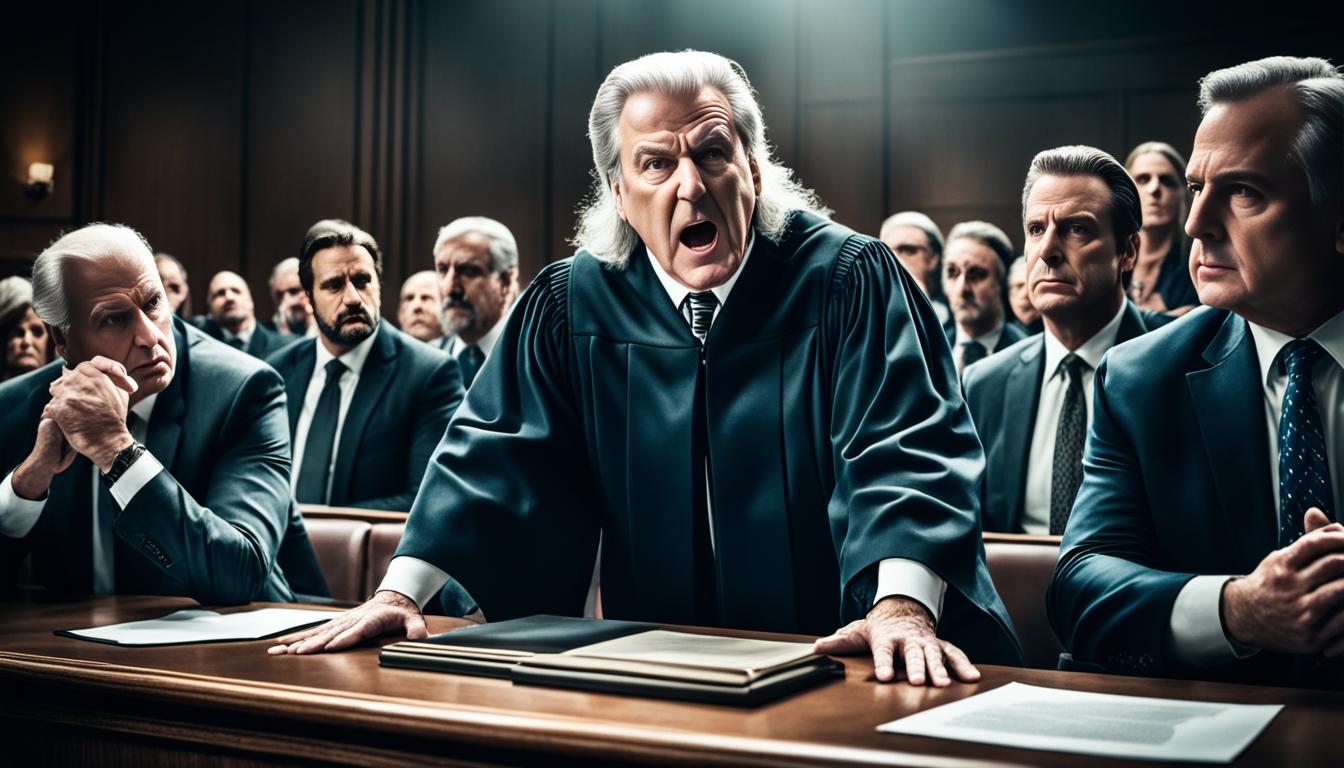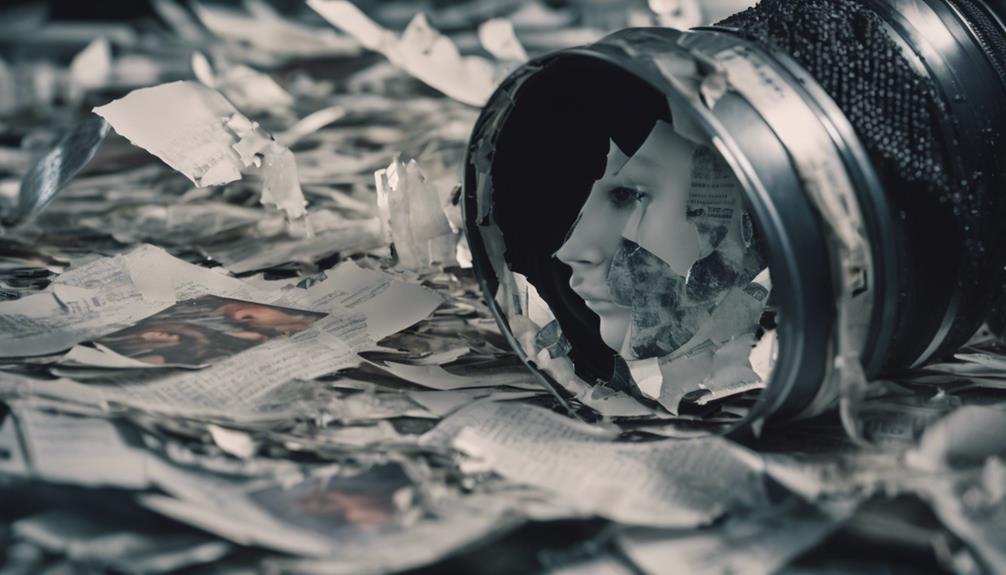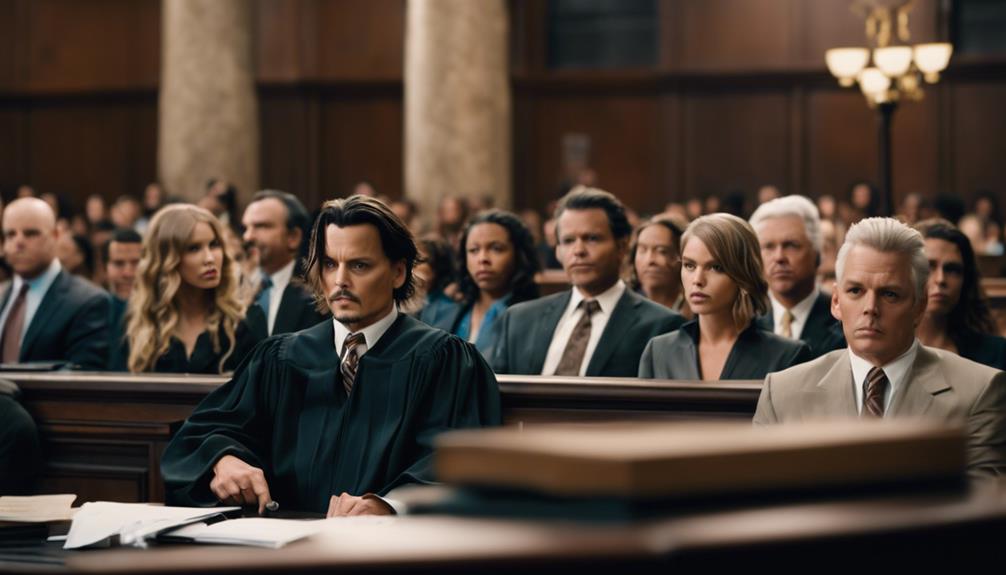In this article, we will delve into the intriguing world of high stakes celebrity lawsuits that have made headlines. From legal battles over intellectual property to defamation claims that have rocked the entertainment industry, these cases have had significant financial and reputational consequences. Let’s take a closer look at some of the key cases that have captivated the public’s attention and shaped the dynamics of the legal landscape.
Key Takeaways:
- High stakes celebrity lawsuits can have a profound impact on the individuals involved and the wider entertainment industry.
- These lawsuits often attract substantial media attention, affecting the reputation and public image of the celebrities.
- Financial losses, hefty legal fees, and potential damages are common consequences of high stakes celebrity lawsuits.
- Some celebrity lawsuits result in landmark legal and financial settlements.
- Copyright disputes and defamation claims are significant issues in high stakes celebrity lawsuits.
Everton Owner Engages in Crisis Talks over Repayment Deadline
Farhad Moshiri, the owner of Everton Football Club, is currently involved in urgent crisis talks with potential buyers, 777 Partners, as the deadline for repaying a £158m loan approaches. The agreement to sell the club to the American group was announced in September 2023, but various challenges still remain, particularly concerning the capabilities of the prospective buyers.
In recent discussions held in London, Farhad Moshiri and representatives of 777 Partners have been trying to navigate the complex situation and find a resolution. The urgency of the situation stems from the impending deadline that looms over the repayment of the substantial loan.
Moreover, the Everton owner is also contending with legal action initiated against 777 Partners by Leadenhall Capital Partners. The lawsuit, filed in a New York court, alleges contractual breaches and fraudulent activities committed by the potential buyers. The legal dispute adds further complications to the already tense situation.
The outcome of these crisis talks and legal proceedings will undoubtedly have a significant impact on the future of Everton Football Club. The Everton owner and the potential buyers must find a viable solution to address the repayment deadline and overcome the obstacles that are currently hindering the completion of the sale. Only then can the club move forward with more stability and certainty.
“The repayment deadline poses a major challenge for Moshiri and his attempts to sell Everton to 777 Partners. The crisis talks and ongoing legal action highlight the complexity of the situation and the high stakes involved,” said a football analyst.
The outcome of these discussions and legal battles will be closely followed by Everton’s fans and the broader football community, as the resolution will shape the future of the club and determine the course it takes in the coming years.
Key Points:
- Everton owner, Farhad Moshiri, engages in crisis talks with potential buyers, 777 Partners, to address the repayment deadline of a £158m loan.
- Discussions between Moshiri and representatives of 777 Partners have recently taken place in London.
- Legal action has been initiated against 777 Partners by Leadenhall Capital Partners, alleging contractual breaches and fraud.
- The outcome of the crisis talks and legal proceedings will have a significant impact on the future of Everton Football Club.
David Beckham Launches £1 Billion Legal Fight Against Counterfeit Sellers
Former footballer David Beckham has taken a stand against counterfeit sellers by launching a monumental legal battle. Beckham, known for his successful career on and off the field, has filed two lawsuits in the US, seeking to eradicate the sale of fake versions of his designer products.
With his name attached to various businesses and brands, including clothing, fragrances, accessories, and more, Beckham is fiercely protective of his intellectual property. In an effort to combat the counterfeit market, his company, DB Ventures, is taking legal action against 500 sellers accused of trading fake merchandise.
“Counterfeit sellers harm the reputation of my brand and deceive customers who believe they are purchasing genuine products,” Beckham stated in a recent press conference.
Beckham’s legal fight is not limited to small-scale operations; he is targeting sellers on major online platforms such as Amazon, Etsy, and Temu. By holding these platforms accountable for facilitating the sale of counterfeit goods, Beckham hopes to send a strong message to the industry and protect consumers from falling victim to fraudulent products.
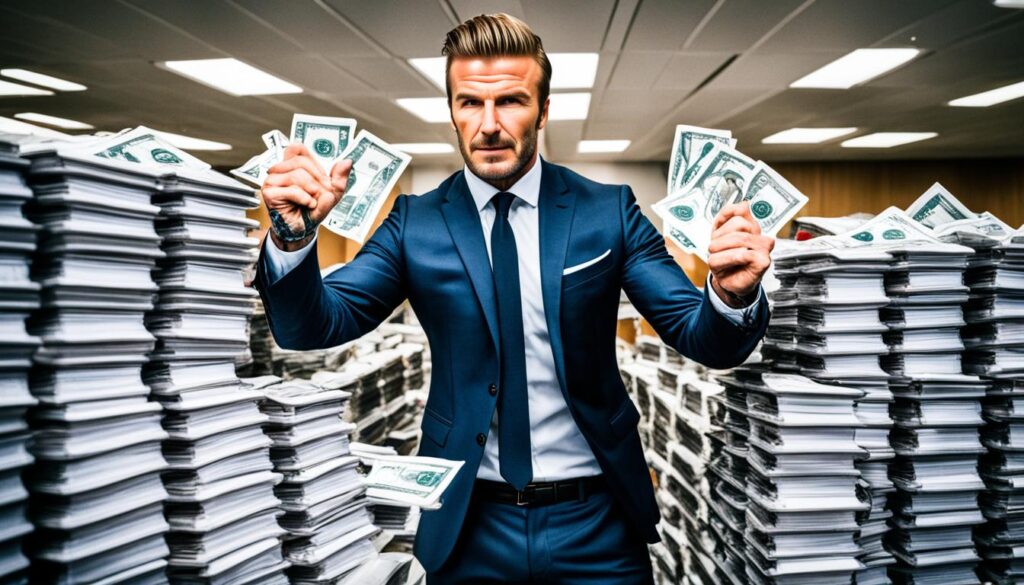
To assert the magnitude of his legal battle, Beckham is seeking £1.6 million from each of the 492 defendants named in the lawsuits. In total, his fight against counterfeit sellers could result in a staggering £1 billion legal endeavor.
Protecting Brand Integrity and Consumer Trust
By taking legal action, Beckham aims to safeguard his brand’s integrity and maintain consumer trust. Products bearing his name are synonymous with quality and authenticity, making it imperative to eliminate counterfeit sellers whose fraudulent activities tarnish both his reputation and the experience of loyal customers.
The impact of counterfeit goods extends beyond financial losses for both the brand and consumers. From poor product quality to potential health hazards, counterfeit items pose significant risks. Through his legal fight, Beckham hopes to create a safer marketplace and provide consumers with authentic products that meet his high standards.
| Implications of Beckham’s Legal Fight | Benefits for Consumers |
|---|---|
| Protection of intellectual property rights | Assurance of buying genuine products |
| Disruption of counterfeit operations | Reduced risks associated with counterfeit goods |
| Financial impact on counterfeit sellers | Support for legitimate businesses and creators |
| Industry-wide message against counterfeiting | Preservation of brand reputation |
This legal battle led by David Beckham marks a pivotal moment in the fight against counterfeit sellers. As the lawsuits progress, their outcomes could set important legal precedents and serve as a deterrent to others engaging in similar illegal activities. Beckham’s commitment to upholding quality and authenticity reinforces the importance of intellectual property protection and the rights of creators.
Professor Fired for Publicly Opposing mRNA COVID Injections
Professor Patrick Provost, a renowned expert in immunology and microbiology, has found himself at the center of a controversy after being terminated from his position at Quebec City’s Université Laval. The decision to fire Professor Provost came as a result of his public opposition to mRNA COVID injections, citing concerns about their efficacy and safety.
With over 35 years of experience in biochemistry, Professor Provost has never shied away from expressing his opinions. In various interviews and public statements, he has boldly asserted that the mRNA COVID injections “are not vaccines” but rather experimental treatments.
The termination letter, dated March 28, 2024, explicitly cited Professor Provost’s stance on mRNA COVID injections as the reason for his dismissal. The letter accused him of spreading misinformation and undermining the public’s trust in the government’s vaccination efforts.
This controversial decision has sparked outrage and divided opinions among the academic community. Some argue that Professor Provost’s dismissal is a violation of academic freedom and the right to express dissenting views. They believe that the university should value intellectual diversity and encourage open dialogue.
In a show of solidarity, several fellow professors have signed an open letter calling for Professor Provost’s reinstatement. They highlight his extensive research and expertise in immunology, emphasizing that his concerns about the mRNA shots are grounded in scientific evidence and should not be dismissed.
Professor Provost’s stance against mRNA COVID injections is rooted in his belief that more rigorous long-term studies are necessary to fully understand their potential risks and benefits. He has expressed particular concern about the use of these injections in children, citing the need for greater caution when it comes to medical experimentation.
While the controversy surrounding Professor Provost’s termination rages on, it raises important questions about the limits of free speech and academic freedom in the face of a global health crisis. As the debate continues, it remains to be seen whether Professor Provost will be reinstated or if the university will stand firm in its decision.
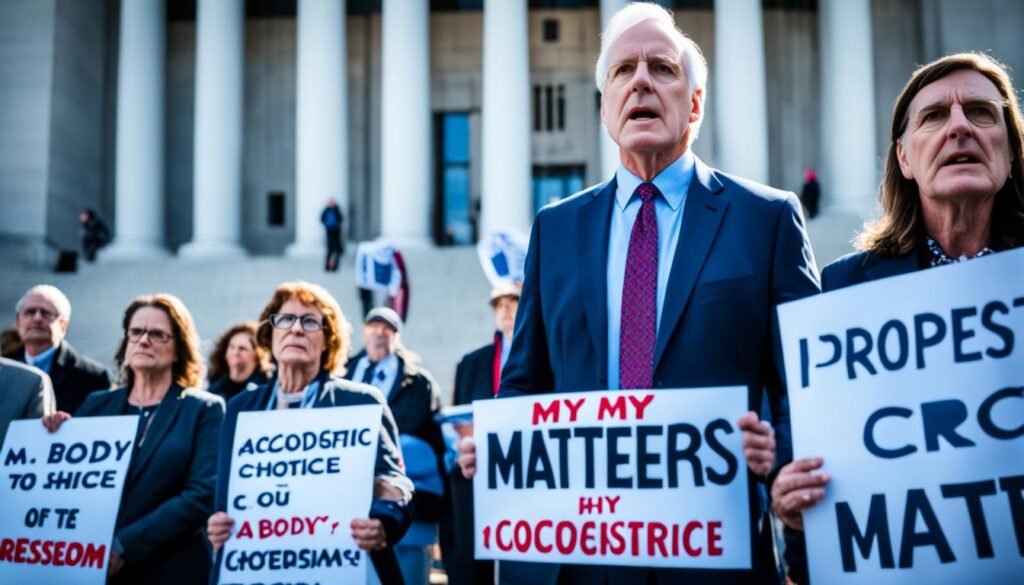
Controversies Surrounding mRNA COVID Injections
| Concerns | Arguments |
|---|---|
| Efficacy | Some experts question the long-term effectiveness of mRNA COVID injections and highlight potential waning immunity over time. |
| Safety | There are concerns about rare side effects associated with the mRNA shots, although the overall risk-benefit ratio remains favorable. |
| Medical Experimentation | Opponents argue that widespread vaccination campaigns constitute large-scale medical experimentation, especially when it comes to children and adolescents. |
| Vaccine Development Process | Critics express skepticism about the speed of vaccine development and approval, citing potential shortcuts and lack of long-term data. |
As with any contentious issue, it is important to evaluate the arguments and evidence presented by both sides. Only through rigorous scientific inquiry and open dialogue can we hope to arrive at a fuller understanding of the mRNA COVID injections and their implications for public health.
The Impact of High Stakes Celebrity Lawsuits
High stakes celebrity lawsuits can have a profound impact on both the individuals involved and the broader entertainment industry. These legal battles, often fueled by immense wealth and reputational stakes, attract substantial media attention and become major talking points. The consequences of these lawsuits extend beyond the courtroom, influencing public perception and shaping the dynamics of the entertainment world.
The impact of high stakes celebrity lawsuits can be seen in multiple aspects:
1. Reputation and Public Image
When celebrities find themselves embroiled in legal disputes, their reputation and public image are inevitably affected. Media coverage of these high profile cases can shape public opinion and potentially tarnish the image carefully crafted by the individuals involved. Negative publicity can result in long-lasting damage to a celebrity’s brand, leading to a loss of endorsements and potential career setbacks.
2. Financial Consequences
High stakes lawsuits come with hefty financial burdens. The legal fees alone can be astronomical, with top-tier lawyers charging substantial hourly rates. In addition, celebrities may be liable to pay damages if found at fault, which can run into millions of dollars. These financial losses can significantly impact their wealth and future earnings, forcing them to make strategic decisions to recover from the setback.
3. Setting Legal Precedents
The outcomes of high stakes celebrity lawsuits often establish legal precedents that shape the future of the entertainment industry. Landmark decisions in copyright infringement, defamation, or contract disputes can influence how similar cases are resolved in the future. These precedents provide guidance for future legal battles and can have wide-ranging implications for both celebrities and industry professionals.
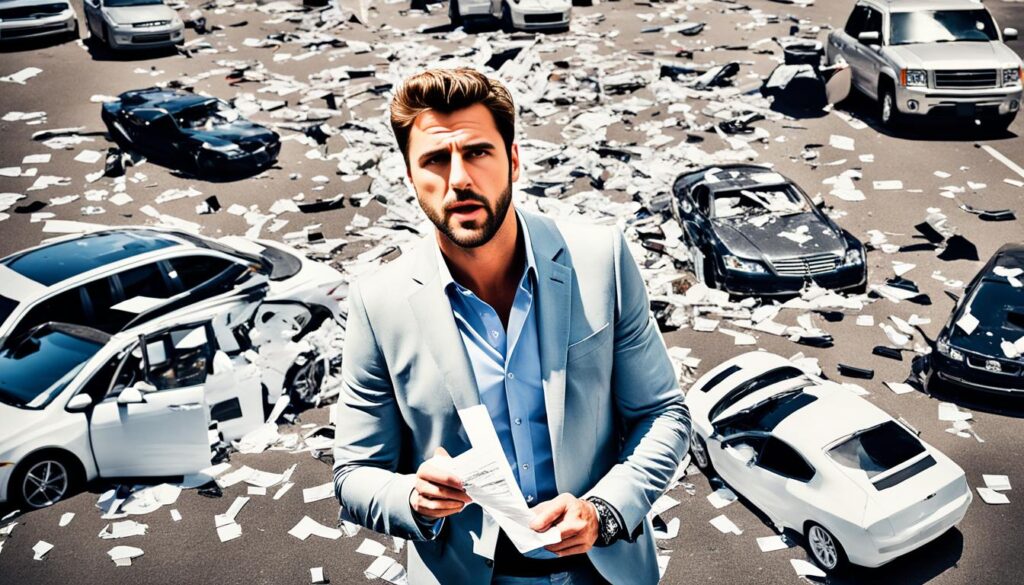
“High stakes celebrity lawsuits not only impact the individuals involved but also have far-reaching effects on the entertainment industry as a whole. From damaged reputations to financial losses and the establishment of legal precedents, these cases shape the narrative of celebrity culture and influence the future landscape of the industry.”
The impact of high stakes celebrity lawsuits cannot be underestimated. These legal battles have the power to alter the trajectory of careers, redefine legal boundaries, and spark conversations about the responsibilities and privileges that come with fame.
Major Financial Settlements in Celebrity Lawsuits
When it comes to high-stakes celebrity lawsuits, the financial stakes can be substantial. In some cases, these lawsuits result in major financial settlements, with significant amounts of money being awarded to the plaintiffs or agreed upon as part of a settlement agreement.
One notable example of a major financial settlement in a celebrity lawsuit is the defamation case brought against ABC News by beauty pageant contestant and businesswoman, Gretchen Carlson. In 2016, Carlson sued the network and its former chairman, Roger Ailes, for sexual harassment, leading to his resignation. The lawsuit was settled for a reported $20 million and also included a public apology from the network.
| Case | Amount | Category |
|---|---|---|
| O. J. Simpson Civil Trial | $33.5 million | Wrongful death |
| Michael Jackson Estate vs. AEG Live | $20 million | Wrongful death |
| Tom Cruise vs. Bauer Media Group | $50 million | Defamation |
| Johnny Depp vs. Amber Heard | $7 million | Divorce settlement |
Other high-profile celebrity lawsuits that have resulted in major financial settlements include the Michael Jackson Estate’s lawsuit against AEG Live for the wrongful death of the pop icon, which ended in a settlement of $20 million. Additionally, actor Tom Cruise received a settlement of $50 million in his defamation case against the Bauer Media Group. In the world of divorces, actor Johnny Depp agreed to a settlement of $7 million with his ex-wife, Amber Heard.
These major financial settlements highlight the profound impact that high-stakes celebrity lawsuits can have not only on the individuals involved but also on their reputations and future earning potential. Furthermore, they demonstrate the financial consequences that accompany legal disputes in areas such as wrongful death, defamation, and divorce.
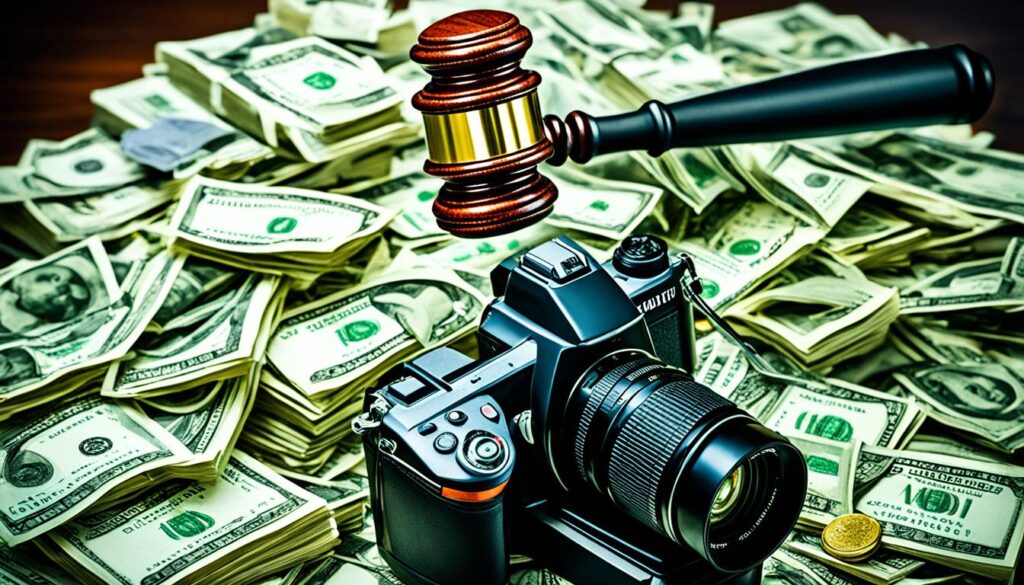
Landmark Copyright Cases in the Entertainment Industry
The entertainment industry has witnessed numerous landmark copyright cases that have significantly influenced intellectual property protection. These cases typically revolve around disputes concerning song lyrics, movie scripts, visual artwork, or other creative works. Legal battles surrounding copyright infringement have far-reaching consequences, as they establish crucial precedents in areas such as fair use, originality, and the safeguarding of creative works. Such cases underscore the fundamental importance of copyright law in ensuring the rights of artists and creators are protected within the ever-evolving entertainment landscape.
Protecting Creative Expression
Landmark copyright cases play a pivotal role in safeguarding creative expression, nurturing innovative industries, and fostering a fair marketplace for artists. These cases serve as catalysts for legal debates surrounding the rights of both individual artists and larger media organizations. By establishing precedents, they clarify the boundaries of permissible usage, ensuring that artists receive recognition and compensation for their creations while fostering a climate of creativity and originality.
“Copyright cases have a profound impact on the entertainment industry, shaping the balance between protecting the rights of creators and fostering a thriving marketplace for their works.” – Legal expert, Sarah Thompson
Preserving Originality and Authenticity
Landmark copyright cases are instrumental in preserving the integrity of creative works by deterring unauthorized and counterfeit reproductions. These cases act as deterrents, setting legal precedents that protect artists from plagiarism and infringement. Through legal battles, copyright holders can assert their rights and ensure the authenticity and originality of their creations remain intact.
The impact of landmark copyright cases goes beyond the immediate parties involved, resonating throughout the entertainment industry. These cases serve as cautionary tales, reminding both established and emerging artists of the importance of respecting intellectual property rights and seeking appropriate licenses and permissions for their creative endeavors.
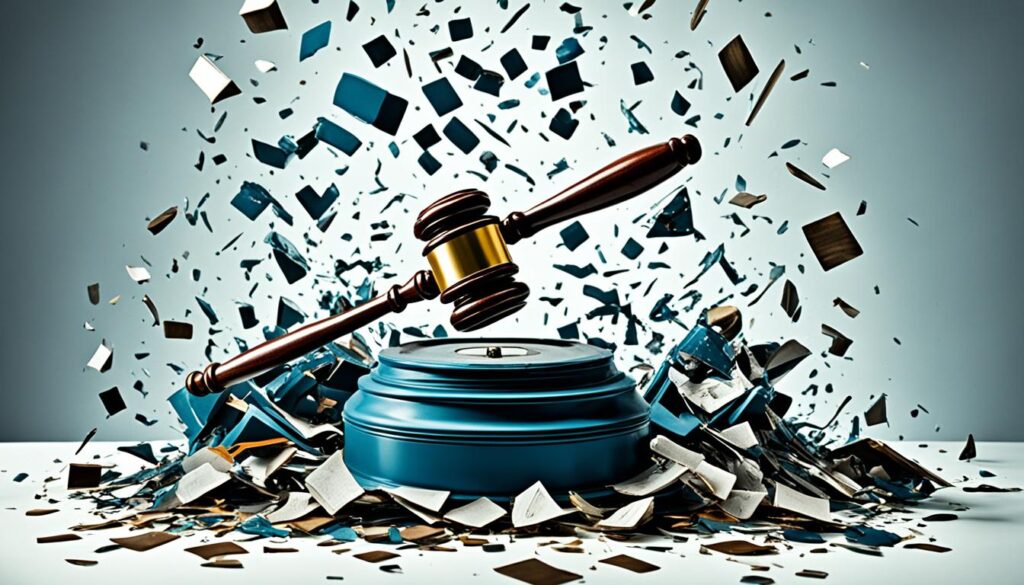
| Landmark Case | Year | Nature of Dispute |
|---|---|---|
| Bridgeport Music, Inc. v. Dimension Films | 2004 | Sampling and Fair Use |
| Blurred Lines Case: Williams v. Gaye Estate | 2015 | Plagiarism and Substantial Similarity |
| Oracle America, Inc. v. Google LLC | 2021 | Software Copyright |
The Ever-Evolving Landscape
As new technologies and mediums emerge, copyright cases continue to shape the evolving landscape of the entertainment industry. The rise of digital platforms and the ease of content distribution have created new challenges and legal debates surrounding the protection and ownership of creative works.
In an era of streaming, social media, and global accessibility, copyright cases play a crucial role in striking a balance between the rights of creators, the dissemination of knowledge, and the fair use of artistic materials. These cases set the stage for ongoing discussions about intellectual property, ensuring the vibrant and dynamic growth of the entertainment industry while safeguarding the rights of its creative contributors.
Defamation Claims and Celebrity Reputations
In today’s world of social media and instant communication, defamation claims have become increasingly common in high-stakes celebrity lawsuits. The power of false statements and damaging allegations to spread rapidly can have detrimental effects on a celebrity’s reputation.
Defamation lawsuits play a crucial role in holding individuals or media outlets accountable for making false statements that cause reputational damage. Celebrities often turn to these legal actions as a means to protect their public image and restore their tarnished reputations.
“Defamation lawsuits provide a legal avenue for celebrities to seek justice and reclaim their reputations.” – Legal expert
When false information is spread about a celebrity, the impact can be significant. It can lead to damaged relationships, loss of professional opportunities, and even mental and emotional distress. Therefore, pursuing defamation claims is essential for celebrities to safeguard their personal and professional lives.
These high-stakes lawsuits not only focus on the financial implications but also serve as a powerful message to the public and media outlets that defamatory statements have consequences.
By taking legal action, celebrities not only protect their own reputations but also send a message that false information and damaging allegations should not be tolerated in society.
The Financial Implications
Defamation claims can have significant financial implications for the parties involved. As reputations are at stake, celebrities often seek substantial damages to compensate for the harm caused. These damages can include monetary compensation for lost earnings, damage to future career prospects, and emotional distress.
Additionally, the legal fees associated with defamation lawsuits can be substantial. Hiring top-notch legal representation and conducting extensive investigations to prove the falsity and impact of the defamatory statements can result in significant expenses.
Overall, defamation claims put high-stakes celebrity lawsuits in the spotlight, ensuring that the impact of false statements on reputations is duly recognized.
The Power of Public Image
For celebrities, maintaining a positive public image is crucial. Their reputations are key to securing endorsement deals, attracting audiences, and building careers. Defamation claims play a vital role in helping celebrities protect their public image from false or damaging information.
When a false statement is made about a celebrity, it can quickly spread through social media platforms, news outlets, and online forums. This can lead to a tarnished image and a loss of public trust.
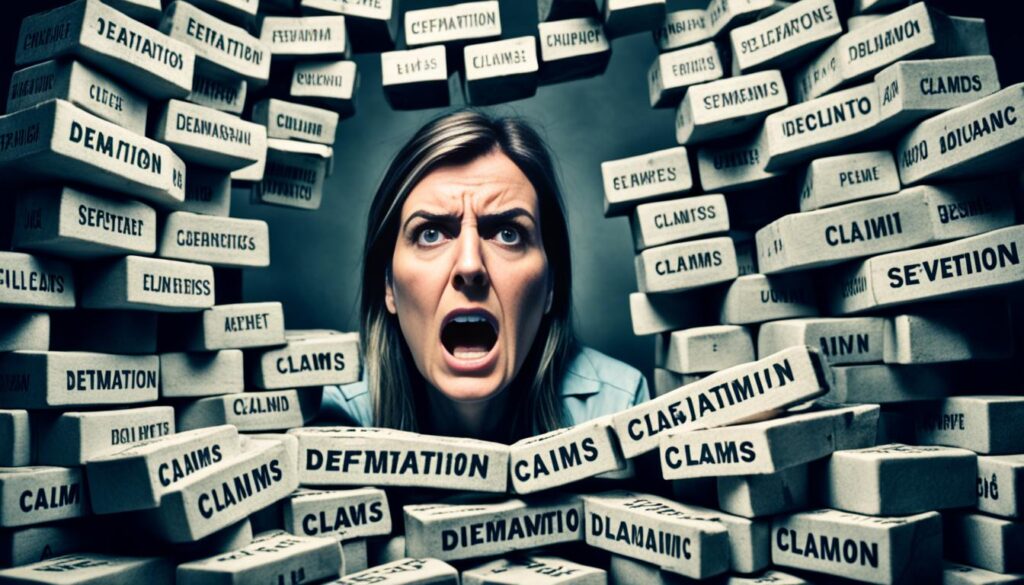
By pursuing defamation claims, celebrities show that they are willing to take a stand against false allegations and set the record straight. These legal actions not only seek to rectify the damage caused but also serve as a deterrent against future defamatory statements.
Defamation claims provide celebrities with an opportunity to regain control of their public narrative and restore their reputations, ensuring that their legacy remains untarnished.
Conclusion
High-stakes celebrity lawsuits continue to captivate the public’s attention, shedding light on the legal battles and financial consequences faced by famous individuals. These lawsuits encompass a wide range of issues, from disputes over intellectual property to defamation claims that can have a lasting impact on reputation. They serve as a reminder of the complexities and intricacies of the entertainment industry, where legal protections are crucial.
As celebrities navigate the legal landscape, the outcomes of these lawsuits shape future legal precedents and have the power to influence the dynamics of the industry. These high-profile cases not only impact the individuals involved but also serve as examples for others, demonstrating the potential consequences of their actions and decisions.
The world of high-stakes celebrity lawsuits is a fascinating one, as it combines the glitz and glamour of the entertainment industry with the realities of the legal system. It serves as a reminder that fame and fortune do not exempt individuals from legal battles, and the repercussions of these lawsuits can extend far beyond the courtroom.
FAQ
What are high stakes celebrity lawsuits?
What types of lawsuits do celebrities get involved in?
How do high stakes celebrity lawsuits impact the individuals involved?
What are some examples of major financial settlements in celebrity lawsuits?
Why are copyright cases significant in the entertainment industry?
How do defamation claims affect celebrities?
How do high stakes celebrity lawsuits impact the entertainment industry?
What are the potential consequences of publicly opposing controversial topics like COVID vaccinations?
Source Links
- https://www.mirror.co.uk/sport/football/news/everton-owner-crisis-talks-stalled-32768671
- https://www.dailymail.co.uk/tvshowbiz/article-13399059/David-Beckham-starts-1bn-legal-fight-against-500-sellers-accused-flogging-fake-versions-designer-products-including-sunglasses-perfumes.html
- https://www.todayville.com/astrazeneca-withdraws-covid-vaccines-worldwide-amid-lawsuits-alleging-severe-harm/

